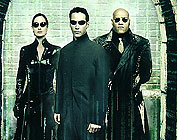|
|
|
|
The
Matrix Reloaded
|
 |
|
On the battlefield of pop culture, I am for the Matrix cycle and against the Star Wars series. Although both blockbuster phenomena share certain features – such as saturation marketing, and a grandiloquent will to invent a modern mythology – it is clear what differentiates them. The Matrix films, written and directed by Andy and Larry Wachowski, are plugged into the contemporary genre of the action film. And there is no better test of the second instalment in the chain, The Matrix Reloaded, than to scan its key action scenes. Two fights are especially outstanding. In a breathtaking marriage of digital special effects and Yeun Wo Ping's choreography, Neo (Keanu Reeves) does battle with not one but several hundred clones of Smith (Hugo Weaving). The kinetic force of this unlikely spectacle is dazzling. Later there is a fifteen-minute car and bike chase along a crowded freeway, closely modelled on the classic sequence climaxing Mad Max 2 (1981). How can a film in which so much is artificially contrived – and in which, furthermore, very little is actually, solidly real – manage to be exciting? The Matrix Reloaded convinced me that this mission is not impossible. But what about the plot? The Wachowskis grapple with a dilemma that faces all popular storytellers once they extend an epic tale over gradual instalments. What should they aim for in each new portion of the whole, consistency or novelty? The Lord of the Rings opts for consistency, but in this case Peter Jackson has a well-known novel, with its already meticulously created universe, to which to refer. George Miller's Mad Max series, by contrast, boldly reinvents its premises with every film. The Wachowskis obviously projected much of the future action of the Matrix saga when they conceived the first film. While wanting to please fans of the original film, however, they clearly abhor simply repeating its mood, characters and moves. On this level, The Matrix Reloaded is an extremely successful sequel, because it feels so fresh. Many new characters appear, including the delightful French couple of the Merovingian (Lambert Wilson) and Persephone (Monica Bellucci). The purely action-oriented villains tend to the dull side: the Twins (Neil and Adrian Rayment), like Smith and his henchmen, still look like refugees from an early '80s rock video. The Wachowskis have an ace up their sleeve in the game of consistency and novelty. In the cyber world they have created, there is always the possibility of another hidden, layer – either another computer program, or the control rooms in which this programming occurs. Hence new, behind-the-scenes characters like the Key Maker (Randall Duk Kim) and the Architect (Helmut Bakaitis). For its first half, The Matrix Reloaded is mostly content to stick with the co-ordinates set up in the first film. But when it comes time to complicate our understanding of this malign universe, the plot goes into a hyperdrive that can leave viewers both dizzy and delighted. One special motif must be celebrated. Not since Fritz Lang's Spione (1928) or Luis Buñuel's The Exterminating Angel (1962) has a film made such splendidly surreal use of doors. Here, doors always open onto starkly different pieces of the world, offering either escape or oblivion. And some of the tensest clinches of the plot involve action in and around these magical doorways. One of the more disturbing aspects of The Matrix was the frankly messianic trajectory given to Neo as The One. But, in The Matrix Reloaded, Neo is not just a fighter, he is also a lover. This time around, the Wachowskis put the love element front and centre, in bold defiance of the nerdy teenage fan base that might find such extravagant romanticism irksome. The Matrix Reloaded is commendably obsessed with erotic love. An early scene in Zion offers a Dionysian dance party, intercut with the sweaty reunion of Trinity and Neo. A later scene of high comedy shows us, with helpful digital graphics, the arousing effect of the Merovingian's doctored chocolate cake on an unsuspecting restaurant customer. But these are mere rehearsals compared to the magnificent scene in which Persephone demands a kiss from Neo right in front of the understandably jealous (and trigger happy) Trinity, and a climactic scene between our central lovers which gives a new, extravagant meaning to the "union of hand and heart" writ large in Lang's classic Metropolis (1927). There are elements of The Matrix Reloaded that are a little thin – especially the teeming life down there in Zion, which seems to barely interest the Wachowskis. But the film pulls off the difficult task of being the middle part of a triptych, neither overly expository nor prematurely conclusive. It's a pity that The Matrix Revolutions (2003) – a strange movie whose peace-mongering message seemed like some weird Hollywood intervention into the Realpolitik of escalating global war – was such a drab letdown. © Adrian Martin May 2003 |
![]()